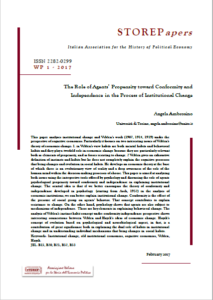STOREPapers WP 1 2017
Angela AMBROSINO, “The Role of Agents’ Propensity toward Conformity and Independence in the Process of Institutional Change“
toward Conformity and Independence in the Process of Institutional Change“
This paper analyses institutional change and Veblen’s work (1907, 1914, 1919) under the perspective of cognitive economics. Particularly it focuses on two interesting issues of Veblen’s theory of economic change: 1. in Veblen’s view habits are both mental habits and behavioral habits and they play a twofold role in economic change because they are particularly relevant both as elements of propensity, and as forces resisting to change. 2 Veblen gives an exhaustive definition of instincts and habits but he does not completely explain the cognitive processes that bring changes and evolution in social habits. He develops an economic theory at the base of which there is an evolutionary view of reality and a deep awareness of the role of the human mind within the decision-making processes of choice. This paper is aimed at analyzing both issues using the interpretive tools offered by psychology and discussing the role of agents psychological propensity toward conformity and independence in explaining institutional change. The central idea is that if we better encompass the theory of conformity and independence developed in psychology (starting from Asch, 1952) in the analysis of economic institutions, we can better explain institutional change. Conformity is the effect of the pressure of social group on agents’ behavior. That concept contributes to explain resistance to change. On the other hand, psychology shows that agents are also subject to mechanisms of independence. These are key elements in explaining behavioral change. The analysis of Veblen’s instinct-habit concept under conformity-independence perspective shows interesting connections between Veblen and Hayek’s ideas of economic change. Hayek’s concept of evolution based on psychological and neurobiological aspect, in fact, is a contribution of great significance both in explaining the dual role of habits in institutional change and in understanding individual mechanisms that bring changes in social habits.
Keywords: Institutional change, old institutional economics, cognitive economics, Veblen, Hayek.
JEL: B15, B20, B25; B52, B53
[Download]
